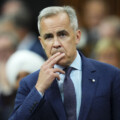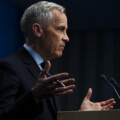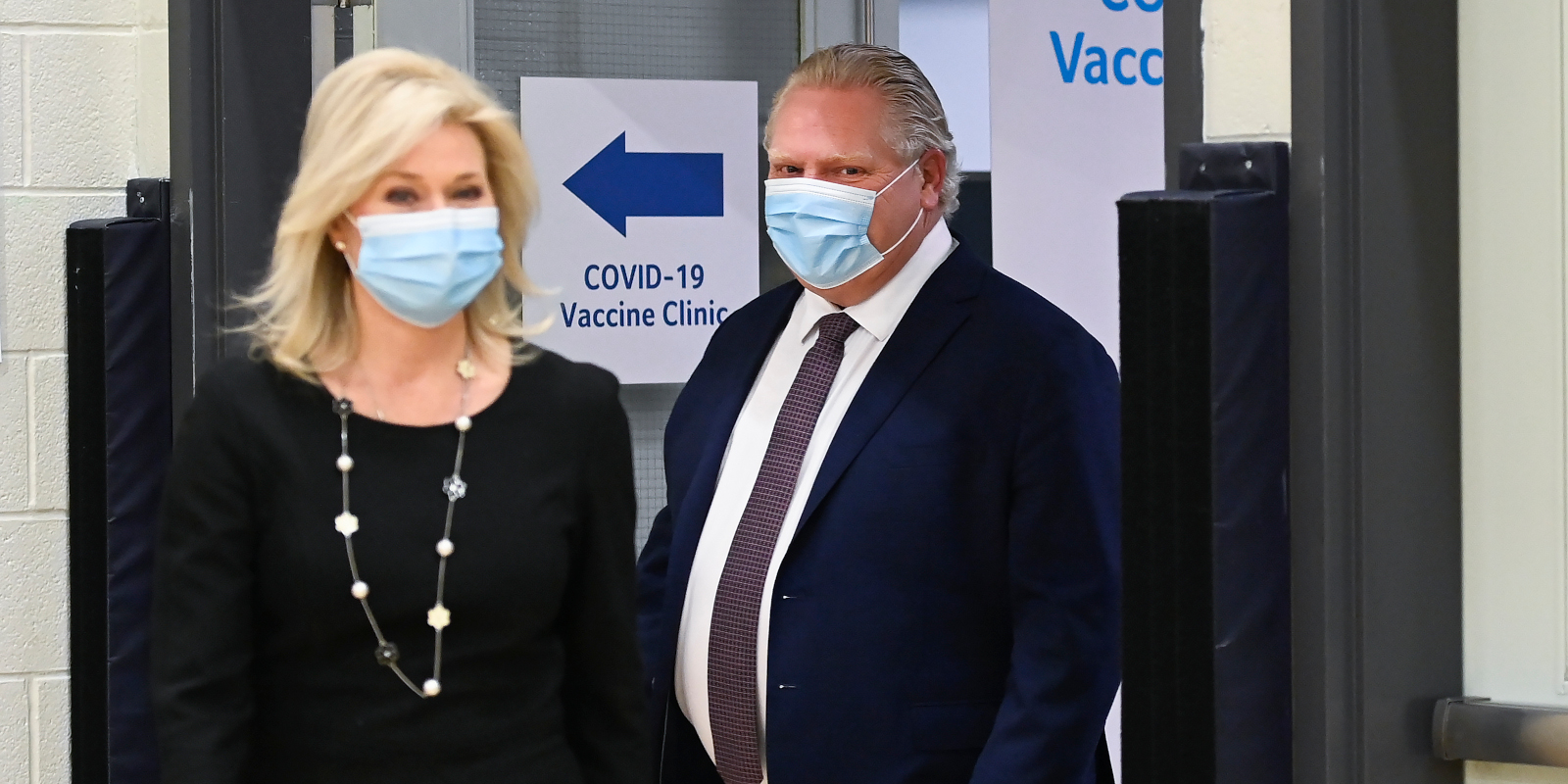One year after Ontario Premier Doug Ford’s Progressive Conservatives won a landslide reelection, little indicates that the province’s opposition parties are any closer to unseating him. The last poll made available to the public was released in March and showed that the PCs remain the most popular choice of Ontario voters by a wide margin.
But one potential challenger thinks Ford might be vulnerable from an unexpected direction: his right flank, as the PC government oversees ballooning budget deficits.
Mississauga Mayor Bonnie Crombie has all but confirmed she will enter the race for leadership of the Ontario Liberal Party and envisions a new type of coalition for the party, which has been languishing in obscurity since Ford’s majority victory in 2018.
“I think the Liberal party moved much too far to the Left. I think traditionally our roots are in the centre. I believe we govern from right of centre,” said Crombie, as she mused about a potential leadership bid.
The last sentence of that statement garnered significant backlash from many OLP supporters, leading to Crombie backtracking from her vision of governing from the right of centre.
But Crombie believes the OLP swung too far to the Left under former Premier Kathleen Wynne and she has proposed bringing the party back to the political centre. She has described herself as both socially progressive and fiscally responsible.
Andrew Perez, a senior consultant with Hill+Knowlton Strategies and a supporter of Crombie’s leadership bid, says Ford’s high public spending has left him vulnerable to criticism about fiscal responsibility.
“Ford is indeed vulnerable on the fiscal front…there is potential for a leader like Crombie, with a fiscally prudent record as mayor, to reclaim this issue set for the OLP,” says Perez. “As Ontario Liberals, we cannot continue to ignore fiscal and economic issues, or even worse completely cede these issues to Ford’s PCs.”
Ford has not exactly made it difficult for an opponent to promise a tighter budget in the next Ontario election. In March, Ford’s PCs tabled a $204 billion budget, the largest in Ontario history, even surpassing the bloated emergency spending budgets during the COVID-19 pandemic. This followed the 2022 budget, which totalled $198 billion and was also the largest in the province’s history at the time.
Crombie has suggested that high spending under former premier Kathleen Wynne was an example of the party going too far Left and that provincial spending could be curbed by delegating spending on issues like child and dental care to other levels of government.
Inflation and higher-than-expected economic growth resulted in a $2.8 budget surplus for the 2021-2022 fiscal year, the first since Ford formed a government in 2018, and the first budget surplus in Ontario since 2007-2008.
However, a report released by the Fraser Institute in February found that yearly per-person program spending by the provincial government reached its highest levels on record in 2020 under Ford’s PCs at $11,558 per-person, and $10,226 per-person when pandemic-related spending was excluded.
A pair of right-wing parties dissatisfied with the Ford government formed prior to the 2022 provincial election, but neither made a real impact on the result, which was an 82-seat majority for the PCs.
David Tarrant, vice-president of national strategic communications at Enterprise Canada, who also worked for Ford between 2018 and 2019, says any OLP leader is unlikely to outflank Ford on fiscal issues.
“The number of people who are concerned about fiscal issues that would choose the Liberal Party over the PC party in Ontario, you can probably count on your fingers and toes,” says Tarrant.
Crombie has said she hopes to attract “Blue” Liberals and “Red” Tories to the party, even though both groups are increasingly marginalized and isolated in Canadian politics. Furthermore, Crombie hopes to attract support in Ontario’s business community, where she has some experience, having worked in corporate roles at both Disney and McDonald’s before entering elected politics.
Tarrant thinks Crombie is doing some things correctly, such as trying to make the OLP’s platform less about opposing Ford. He says that having a base of partisans who dislike a particular leader does not win elections, citing the inability of the OLP or the federal Conservatives to win by disproportionately focusing on Ford and Prime Minister Justin Trudeau, respectively.
However, Tarrant says appealing to fiscally conservative, socially liberal voters is not the alternative.
“When it comes to the whole idea of where the centre of Ontario politics is, or where the centre of federal politics is…a notion that Canada’s population is naturally fiscally conservative and socially progressive or socially liberal, that’s just plain wrong,” says Tarrant.
Lloyd Rang, a former advisor and chief speechwriter for former premier Dalton McGuinty, says that while Ford is a pragmatic, populist conservative, he leans politically Left or Right on any given day, and that those political labels are not very helpful in 2023.
“A lot of people get hung up on that distinction about right of centre, left of centre, centre, and the Overton window has been sliding around in the last few years to the point where I don’t know that that’s the useful designation anymore,” says Rang.The Overton window refers to the set of ideas and policies that are generally seen as acceptable to the electorate.
Several commentators have attributed Ford’s victory in 2022 to the perception of his government as pragmatic and unwilling to rock the boat.
“People didn’t elect and re-elect Dalton McGuinty because they thought he was a fiscal conservative,” says Tarrant. “They elected him because they thought he was a steady hand that wasn’t gonna do anything to alarm them, or shock them, or put their future at risk.”
Crombie has stated she believes the OLP needs to win back support in rural and small-town Ontario, which tends to vote conservative at both the provincial and federal levels. Perez says that the historically low voter turnout in the 2022 provincial election, less than 44 percent, means there is potential for the OLP to appeal to a large number of Ontario voters in 2026.
“There is tremendous potential to siphon off ‘soft PC voters’ who are likely disillusioned with the current government on several fronts,” says Perez, while noting the OLP needs to keep progressives satisfied as well.

Perez says the OLP needs a leader who will help Ontario grow and generate more wealth to fund key social programs, and that Crombie is that leader due to her approach, as well as her base of support in Mississauga that has enabled her to win three consecutive mayoral elections. He also says that the OLP can win the next election if it has the right leader and platform.
“The key to restoring the OLP, and indeed returning to government, is for the party to return to the ‘centre’, offering a bold set of progressive policies within a broader economic framework that stresses growth and innovation as much as social policy,” says Perez.
Perez is not alone in believing Crombie could be the key to the OLP returning to power. Rang says there are no quick fixes in politics and every time a quick fix is chased, the party will suffer.
“The question for Bonnie is: are you prepared to stay and do the work past this election cycle and into the next one, and the next one? Are you willing to stay and do what it takes to build the party?” says Rang.
Tarrant says there is no electoral coalition in Ontario, or in Canada, that wins elections by being fiscally conservative and socially progressive.
“What the (Ontario) Liberal Party needs to be is not crazy, and that’s different. You want to show that you’re not weird, you want to show that you’re competent, you want to show that you won’t bankrupt the province,” says Tarrant.
Recommended for You

The Notebook by Theo Argitis: Mark Carney’s first major tests

The Weekly Wrap: Trudeau left Canada in terrible fiscal shape—and now Carney’s on clean-up duty

Ben Woodfinden: Lament for an ‘elbows up’ nation

Carney’s next budget will be built on a shaky fiscal foundation




